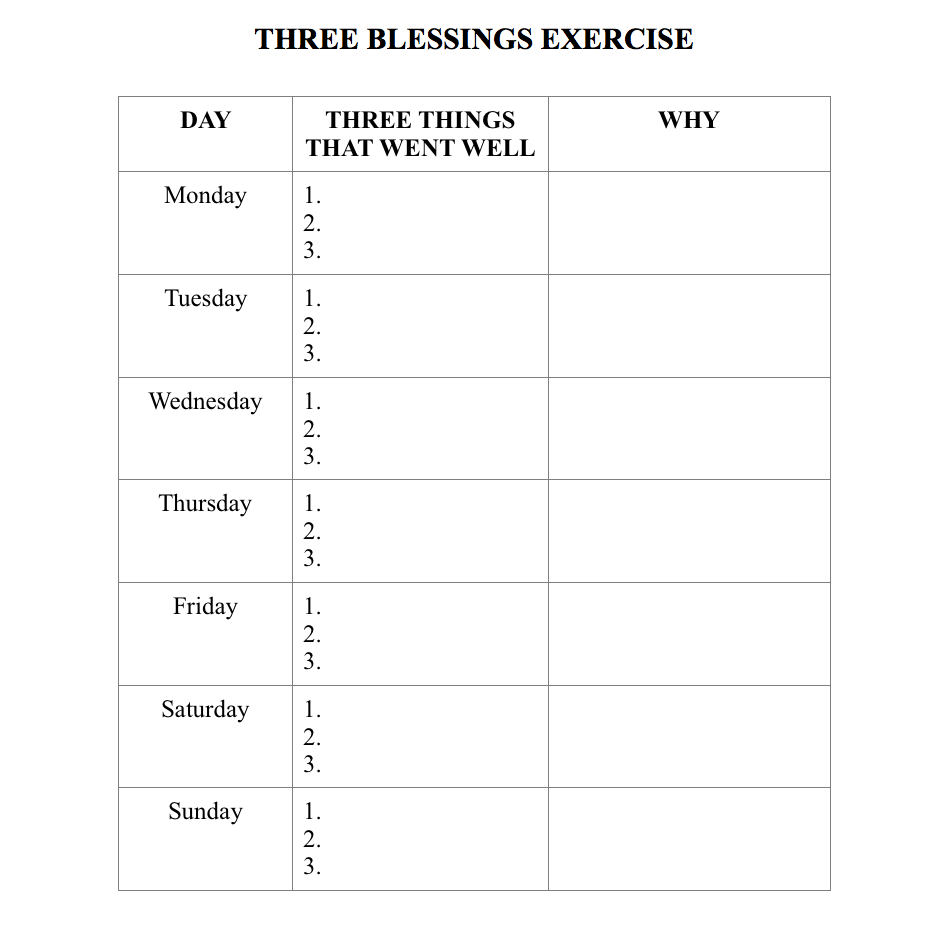|
Depression is a nasty and debilitating disorder. When it is severe, there are four sets of symptoms: a chronic sad fatigue, a sense that the future is dreary, a sense of helplessness, and a loss of positive appetites. The field of psychology and psychiatry have tried to treat depression for many years with antidepressant drugs and or counselling. The success of treatments tends to be confined to moderate relief in about 65-70% of cases. Embarrassingly for our profession, placebos (that is when someone thinks they are getting a drug but are in fact getting an aspirin) have a 45-50% success rate! For those of you suffering from depressiveness, what can you do? Well Martin Seligman has just reported a fascinating piece of research, the pioneer of positive psychology, regarding what one can do to make a difference to depression. They did research on the effectiveness of completing the simplest and most uncomplicated of tasks. It was simply this: Depressed people were required to write down three things that went well that day and why they went well. That’s all. Nothing more. No counselling. No drugs. No talking. Just write down three blessings. It was called the THREE BLESSINGS exercise. They had to do it for one week. Here are the results. 50 severely depressed people participated in the study. At the end of that week 47 of them reported being far less depressed. In terms of overall happiness, 46 of the fifty people increased their happiness significantly. These results were actually better than a comparable group who took drugs or received counselling! Now before we run away with ourselves with this, there is a lot more research that needs to be done to examine the validity of these findings, but they point to something critical to everyone struggling with depressiveness. What we can learn from this is simple – there are positive and simple things you can do on a daily basis to change your mood. The THREE BLESSINGS exercise may seem hoaky, or trivial. You might, like a lot of people, justify your depressiveness by saying such things as “I am such a complicated person that a simple change wont do much for me.” “My depressiveness is very deep and a result of a lot of bad experiences, so changing is going to be very difficult for me.” Or “Things like that might wok for other people, but I am different.” Such thinking is not helpful. What we find is that major changes are a consequences of small one’s. Small changes can change big systems quite dramatically. Take the metaphor of the log-jam. You will have experienced this in traffic when one car can cause a back-up of up to a hundred cars because it has manoeuvred its way badly up Barrack Street, Blarney Street, or Sunday’s Well. However, to let the traffic flow correctly again may mean only a small change. If one car reverses a few feet and allows another one through the entire traffic jam can be released. In other words what can look like a huge traffic problem can be freed up by a small change. It’s the same with changing one’s life. One small change can have a huge effect on the flow of your emotional life. I sat with a young woman this morning that has been suffering from depression. We sat down for an hours and wrote out a list of all her goals and objectives for the next two years. At the end of our session she had a list of about 50 things she would have to do to achieve her dreams over that time. She was thrilled because when she came in she felt that there was no focus to her life, and nothing to get out of bed for. However, though it was a relatively simple task to do what I had done, this girl had never in her life taken an hour to think in a disciplined to convert her dreams into goals and to convert her goals into easy-to-do objectives. Discipline is Depression’s most feared opponent. Why not try the Three Blessings exercise and see what happens. Blue-tack a sheet of paper to your bedroom wardrobe with the following grid: Don’t be so proud or cynical to think that you are above such simplicity of living. Count your blessings. You, and they, deserve it.
0 Comments
Leave a Reply. |
AuthorDr. Colm O'Connor is a Cork Psychologist. He has written hundreds of articles on family psychology - some posted here. Archives
July 2018
Categories
All
|

 RSS Feed
RSS Feed
